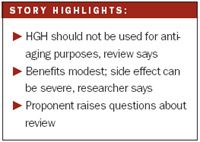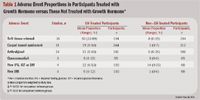- Acne
- Actinic Keratosis
- Aesthetics
- Alopecia
- Atopic Dermatitis
- Buy-and-Bill
- COVID-19
- Case-Based Roundtable
- Chronic Hand Eczema
- Chronic Spontaneous Urticaria
- Drug Watch
- Eczema
- General Dermatology
- Hidradenitis Suppurativa
- Melasma
- NP and PA
- Pediatric Dermatology
- Pigmentary Disorders
- Practice Management
- Precision Medicine and Biologics
- Prurigo Nodularis
- Psoriasis
- Psoriatic Arthritis
- Rare Disease
- Rosacea
- Skin Cancer
- Vitiligo
- Wound Care
Article
HGH: The debate continues
Author(s):
National report - Human growth hormone (HGH) should not be used for anti-aging purposes, as the therapy has demonstrated little efficacy and carries the risk of potentially serious side effects, a recent literature review indicates.

Still, those results may do little to settle disagreement over the use of HGH, which generates strong opinion on both sides of the fence from members of the scientific and medical communities.
Investigators led by research fellow Hau Liu, M.D., in the division of endocrinology and the Center for Primary Care and Outcomes Res-earch at Stanford University, Stanford, Calif., conducted a systematic review of published studies to evaluate the safety and efficacy of HGH in healthy older adults.

Dr. Liu describes the results as surprising, but expected at the same time.
"To our surprise, very limited research has been done evaluating growth hormone in this age group, especially in randomized, controlled trials," he says.
Only 31 papers, describing 18 populations with a total of about 500 patients, met the study's inclusion criteria, with about half of those actually receiving HGH. Dr. Liu describes the evidence as scant, but says the results suggest that benefits are modest or minimal.
"We found that body composition changes a little bit - that fat mass decreases a little over 2 kg and lean mass increases, on average, about 2 kg.

Conversely, Dr. Liu says definite increased risks are indicated for potentially serious side effects, such as increased tissue swelling, joint pain, gynecomastia and a trend toward increased rates of diabetes and pre-diabetes.
Those results, coupled with the hundreds of thousands of dollars Dr. Liu says patients are reportedly paying for HGH therapy, and the fact that distribution of the growth hormone for anti-aging use is illegal in the United States, led the study to conclude that growth hormone should not be used for anti-aging purposes.
Results 'expected'

"Although the small number of studies, variations in doses and the duration of the studies in different populations make it difficult to interpret as a whole, researchers found the frequency of adverse effects is significant and benefits are small to nonexistent," she tells Dermatology Times.
"Their conclusion that growth hormone is not efficacious as an anti-aging intervention and is associated with side effects has been the standpoint of the National Institute of Aging for some time."
Newsletter
Like what you’re reading? Subscribe to Dermatology Times for weekly updates on therapies, innovations, and real-world practice tips.














